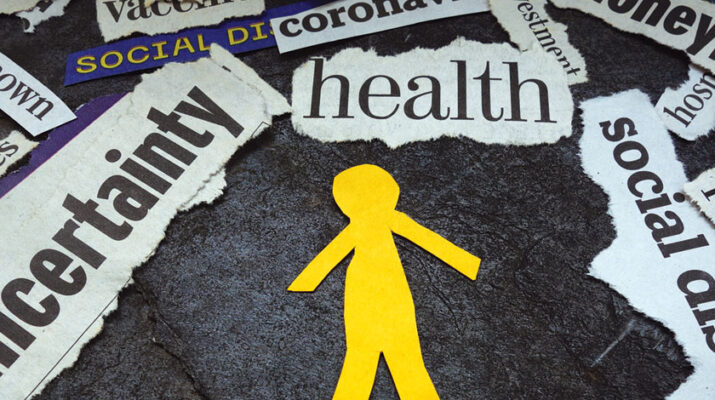Mind over matter: Different conditions can compromise quality of life
By Barbara Pierce
New research finds that a significant number of COVID-19 patients developed a mental health issue — like depression, anxiety, or dementia — within three months of their COVID diagnosis.
The term mental health refers to cognitive, behavioral, and emotional well-being — how people think, feel, and behave. When people have mental health issues, they are experiencing a disruption in these areas.
There’s a subtle distinction between mental health issues and behavioral health issues. Behavioral health looks at how your behaviors impact your well-being — behaviors like eating, drinking habits, and addictive behaviors. While some mental health issues are related to behaviors, most are caused by brain chemistry or genetics.
There is misunderstanding about mental health issues, and this may help clarify:
— An anxiety disorder is more than ordinary worry; it is frequent excessive, persistent worry and fear about everyday situations. It may involve episodes of sudden feelings of intense anxiety and terror that peak within minutes (panic attacks).
— Mood disorder describes a serious change in mood to depression or mania.
— Depression causes a persistent feeling of sadness and loss of interest in activities. It affects how you feel, think and behave; you may have trouble doing normal activities, and sometimes feel life isn’t worth living.
Depression is a continuum of disorders, mild to major. Most severe is major depression. Symptoms include depressed mood most days, loss of interest in activities, withdrawal, appetite changes, sleep changes, loss of energy, poor concentration, and thoughts of death.
Some experience delusions or hallucinations. Hallucinations involve seeing or hearing things that aren’t there. Delusions are beliefs in things that aren’t real.
Depression debilitating
Just getting out of bed in the morning seems impossible when you feel depressed. Depression — that heavy feeling of sadness that goes on and on.
You may feel hopeless, lack energy, and can’t get excited about anything. You might be isolating yourself.
You feel unmotivated to do just about anything. Even simple things, like getting out of bed and getting dressed, become large obstacles.
More than just a bout of the blues, you can’t simply “snap out” of it. Most people improve with medication and therapy.
— Bipolar disorder: Also known as manic-depression, it includes alternating periods of depression and mania, strong shifts in energy, mood, and activity levels, and switching between extreme excitement (mania) and depression. These shifts can affect the ability to perform daily activities and can last days, weeks, or months.
Manic periods are associated with an intense drive to be active, inability to sit still, grandiose ideas, motivation to achieve big things, rapid speech, poor sleep, irritable or elated moods.
Depressed periods are associated with overwhelming fatigue, low moods, and suicidal thoughts and behaviors.
Some may have mixed states, where they are very active or agitated but simultaneously very distressed.
Medication can bring the episodes under control and prevent relapse. Many people with bipolar disorder have long periods of being well.
Some with bipolar disorder experience hallucinations or delusions. Their symptoms may be mistaken for schizophrenia; however, they are different chronic disorders.
— Schizophrenia causes symptoms more severe than those of bipolar disorder, and is less common. Symptoms include hallucinations and delusions, disorganized thinking; and many are unable to care for themselves.
Other symptoms include social withdrawal, loss of interest in activities, flat affect (lack of emotions), moodiness, and other symptoms that cause the inability to function socially or in a work situation.
Medication treats some of the symptoms, but is not a cure. It reduces psychotic symptoms, but is less helpful for treating symptoms such as social withdrawal, lack of motivation, and lack of emotional expressiveness.
— Seek help: Most of these mental health issues don’t go away on their own, and may get worse. A mental health specialist is a good place to begin. He or she can determine whether medication would be helpful and get you to the right place.
The Mobile Crisis Assessment Team is a resource for Oneida, Herkimer, Schoharie, Otsego, Delaware and Chenango counties: “We’re here 24/7 for people who need a little support as well as those who are experiencing a serious mental health concern,” said director Kristin Sauerbier.
“There’s no charge for our services,” she added. “We’ll talk over the phone, or go to where you are if you agree.”
For its assistance, call 315-732-6228 or 844-732-6228 anytime.

